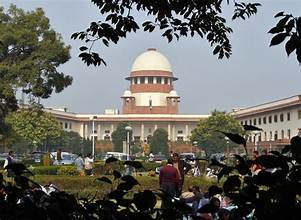The Supreme Court on Tuesday set aside the Calcutta High Court verdict of October 18, 2023, which acquitted a 25-year-old man for engaging in sexual activity with a minor girl, and had asked the adolescent girls to control their sexual urges.
The Bench of Justice Abhay S Oka and Justice Ujjal Bhuyan delivered the verdict in a suo motu case titled “In Re: Right to Privacy of Adolescents,” which was taken after the High Court made some unpleasant remarks regarding adolescent girls.
The Apex Court set aside the controversial remarks and restored the conviction of the accused under Section 6 of the Protection of Children from Sexual Offences (POCSO) Act, and Sections 376(3) and 376(2)(n) I.P.C.
The Apex Court further issued guidelines regarding how to write judgments and also directed the States to implement provisions of Section 19 (6) of the POCSO Act, along with Sections 30 to 43 of the Juvenile Justice Act.
Pronouncing the verdict, Justice Oka said that a committee of experts has been constituted to help the victim in the case to make an informed choice.
On October 18, 2023, the High Court Bench of Justice Chitta Ranjan Dash and Justice Partha Sarathi Sen made sweeping observations on the sexual behaviour of adolescents, particularly teenage girls, while overturning the conviction of a 25-year-old man under the POCSO Act, 2012.
Exercising its powers under Section 482 (inherent powers to secure the ends of justice) of CrPC, the High Court noted that the lack of recognition of consensual sexual behaviour of older adolescents has resulted in their automatic criminalisation, as well as a ‘conflation of consensual acts with non-consensual acts’.
The Bench took into account the fact that the victim married the convict and that a child was born in the relationship.
Laying down a set of duties to be followed by adolescent boys and girls, the High Court observed that it was the duty of every female adolescent to protect her right to the integrity and anatomy of her body, her privacy, dignity, and her self-worth.
It further directed adolescent girls to thrive for the overall development of their self-transcending gender barriers.
The Bench noted that adolescents, especially girls, should control their sexual urges. As soon as she gave in to enjoy the sexual pleasure of hardly two minutes, such an adolescent girl became a loser in the eyes of society, added the High Court.
It said a male adolescent should train his mind to respect a woman, her self-worth, her dignity & privacy, and her right to autonomy of her body.
The High Court also said that sex in adolescents was normal but sexual urge or arousal of such urge was dependent on some action by the individual, maybe a man or woman. Therefore, sexual urge was not at all normal and normative.
It emphasized the absence of provisions in the POCSO Act to address consensual, non-exploitative relationships between adolescents aged 16-18.
The remarks led the Supreme Court to take suo motu cognisance of the verdict. The Apex Court said that these observations were not only highly objectionable but also completely unwarranted as they violated the rights of adolescents under Article 21 of the Constitution.
During the course of hearing, the Apex Court expressed concern over the High Court’s deviation from its remit to decide solely on the merits of the appeal, criticizing the judges for expressing personal views and preaching.
The top court of the country further voiced disapproval of the general trend of various courts to indulge in victim-shaming and stereotyping victims of sexual assault, noting that writing such judgments was absolutely wrong.
It emphasized that the exercise of individual rights should not be made contingent upon fulfilling socially defined duties, particularly those imposed on women.
Senior Advocate Madhavi Divan, appointed as amicus curiae, argued that the High Court’s observations lacked any empirical or social reasoning and were disconnected from reality. She said that judges must base their decisions on constitutional morality rather than personal biases.
The Apex Court further questioned the High Court’s authority to invoke Section 482 CrPC in an appeal to set aside a conviction on the ground that POCSO should be amended to recognise adolescent sexuality.
It also questioned the remit of the High Court to set aside a conviction under the POCSO Act, merely on the basis that the sexual intercourse was with ‘consent,’ when a minimum punishment has been prescribed under the statute, in the absence of a constitutional mandate to do ‘complete justice’ that was enjoyed by the top court.
The Bench further heard the issue of adolescent sexuality and the need for judicial discretion in cases involving consensual relationships between minors.
It cited the 283rd report of the Law Commission on the age of consent under the POCSO Act, highlighting the concerns about the blanket criminalisation of adolescent sexual activity and recommended granting courts the discretion to impose lesser sentences in certain cases.
The State of West Bengal also filed a special leave petition challenging the High Court’s judgment on its merits. Appearing for the State, Senior Advocate Huzefa Ahmadi argued that the High Court had misused its powers under Section 482 of CrPC and Article 226 of the Constitution.
The Senior Counsel stressed that criminal convictions must be strictly examined based on statutory laws.


